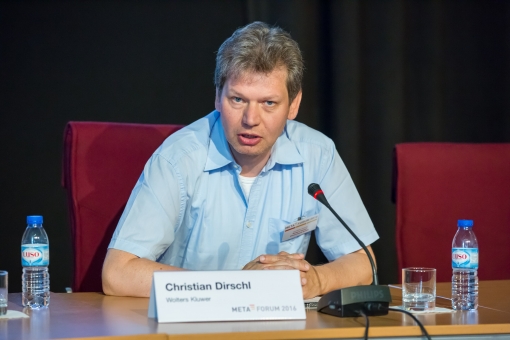
Christian Dirschl - Chief Content Architect at Wolters Kluwer Germany - is responsible for the content structures, metadata, taxonomies, and thesauri within Wolters Kluwer Germany. He manages text mining and automatic topical classification projects. He also represents Wolters Kluwer Germany in international projects like LOD2 or ALIGNED. At SEMANTiCS Christian Dirschl is chairing the call for industry and use case presentations where he curiously waits for the call to close so he can finally go through all the amazing submissions we receive. In this interview Christian passionately talks about his job, the role of semantic technologies from an AI-perspective and the benefits of visiting SEMANTiCS Conference in Vienna this year.
Wolters Kluwer is a former publishing company that has successfully proven how digital transformation works. Could you please provide us with insights what services Wolters Kluwer was providing in the past. How does the organization look today?
Ten years ago, we were a traditional global publisher with extensive expertise in professional areas like legal, tax and health. Our portfolio was mainly based on print publications like books, loose-leafs and journals. We had some software and other digital business like research databases in place, but the processes and the attitude was still paper-driven. Now, we are a truly digital service oriented company with a clear customer focus and on a global scale around 87% digital and related services revenue. Our main asset is still our knowledge about domains and customers, but the portfolio has evolved dramatically with our focus on offering technical systems to enable our customers to manage critical decisions more effectively and accurately.
You are the chief content architect at Wolters Kluwer. What does this job role imply?
I love my job. I am part of the recently implemented Innovation and UX team in Germany. My main task is to identify, understand and evaluate technical trends, e.g. in the area of data science, AI or Big Data, which could help us in our ongoing transformation process towards becoming a smart data company. Therefore, I am participating in H2020 projects like LOD2 and ALIGNED, I am introducing collaborations with universities and research organizations like ADAPT in Ireland and I promote my experience and my ever growing curiosity in conferences like SEMANTiCS. At Wolters Kluwer we always aim at using and creating technology for the real world. So in the end, it is great to see how those technologies can be used to help our customers making a deep impact when it matters most.
The evolving technology stack that fuels your business models includes semantic technologies. Could you please describe why semantics play a crucial role?
Our business is about knowledge and data. A lawyer must know what new legislation is affecting his work; and a doctor must stay up to date with his skills and experience in order to help his patients in an optimal way. Semantics is a critical ingredient in these tasks, since it is bringing the knowledge that used to reside in the heads of our authors to the machines and software tools that our customers are using. So semantics, e.g. in the form of knowledge graphs makes professional AI systems like data analytics or also more simple applications like efficient professional workflows possible and sustainable on a global scale.
You are following these developments since the beginning of the 1990ies, and since 2001 at Wolters Kluwer. Technology trends come and go. In which direction do you see content and data-driven technologies developing?
These technologies will further gain importance, because we are fast moving towards a global data economy with all the opportunities, challenges and risks that come with it. However, the tasks at hand remain complex and there is no “world formula” in sight which could address everything. Therefore, technology will on the one hand address more and more tasks, and on the other hand, questions around cybersecurity, ethics and societal impact will and have to be at the core of our discussions and decisions. We as a society need to decide on what is acceptable for our future and what is not.
Wolters Kluwer is an important industry partner in research projects. How do collaborations with academic institutions look like? How do you benefit from it?
Collaboration with academia is a cornerstone of our innovation strategy. Innovation is the main driver for our transformation process – and innovation requires impulses from outside our own world. There are many different kinds and levels of collaboration in place. We collaborate in funded research projects, in dedicated industry projects with a business focus; but we also organize and sponsor events like hackathons and conferences. And of course we support exploitation efforts by implementing innovative technology in our own systems or even finance and acquire spin-offs from universities etc. The main benefit for us is know-how and technology transfer into our evolving organization. But we also hire people during and after these collaborations and enrich our Wolters Kluwer family with new ideas and skills.
You are at the advisory board of SEMANTiCS. Why should CIO visit the conference?
CIO’s face a multitude of challenges in their evolving role within their organization. They need to make the right decisions for today’s business, but also need to have an IT strategy in store, especially about the role of data in their company. SEMANTiCS with its dual approach of a clear industry focus as well as know-how transfer from academia is a perfect source of information for both challenges. Industry people will report innovative technology that already works in operational environments and researchers will report on trends and findings that could have an impact on strategic level. And all this is available in a condensed fashion in two days in a single and attractive venue in Vienna.
Elaborate with Christian on the possibilities for collaborations between academia and industry at SEMANTiCS 2018. Register now!